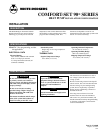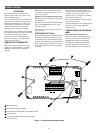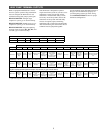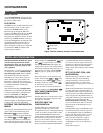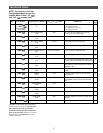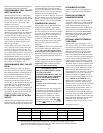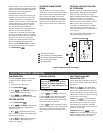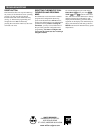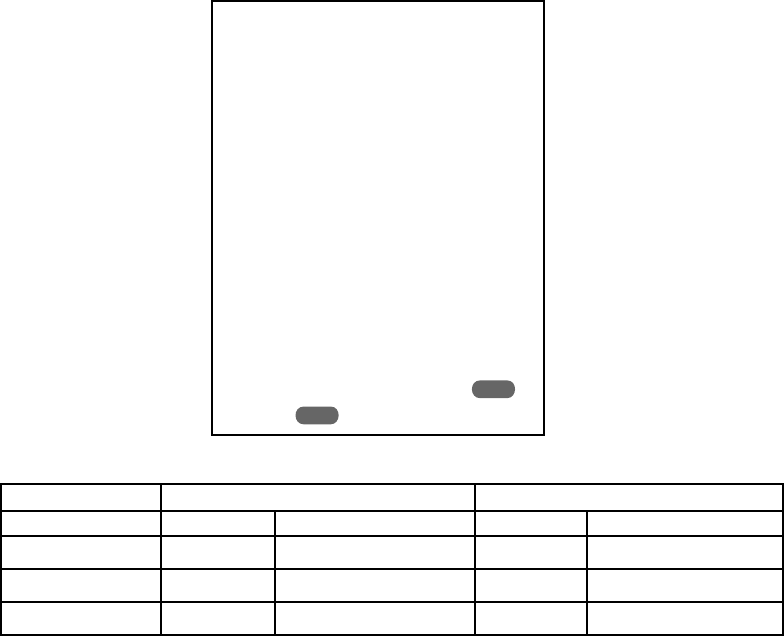
6
These numbers are approximate and represent operation with a typical system. Actual
temperature differentials and run times may vary widely based on your building and equip-
ment, as well as outdoor temperature conditions.
The chart below shows how this adjustment
range affects thermostat performance.
PROGRAMMABLE COOL FAN-OFF
AND FAN-ON DELAY.
(Installer table steps 6 and 7.) These items
allow a selection of 0 to 127 seconds of fan-
off delay after the thermostat has satisfied the
call for cool, or a fan-on delay of 1 to 30
seconds on a call for cool (or heat pump
compressor activation).
The fan-off delay allows the fan to continue
running after the compressor has shut off.
This distributes the cool air that would
otherwise stay trapped in the air conditioning
coils through the ducts. Ideally the timing
would be set so the fan shuts off just as the
cool air is exhausted. If this timing is set too
long the fan may begin blowing warm air
before it shuts off. Shortening the fan-off
delay will prevent this.
A short delay to allow the A-coil to cool
off (or warm up in heat pump) before the
fan turns on may be preferred. This also
allows the compressor and the fan to come
on at slightly different times, which allows
full power to the compressor on start up.
Recommended setting for fan-on delay is
10 seconds or less. A system that does not
have a high head pressure cutout should
have a delay of 10 seconds or less.
PROGRAMMABLE HEAT FAN-OFF
DELAY.
(Installer table step 8.) This item allows a
selection of 0 to 127 seconds of fan-off delay
after the thermostat has satisfied the call for
heat when ELECT HEAT FAN is selected
ON and system is in Emergency mode.
The fan-off delay allows the fan to continue
running after the burner, heating element,
etc. has shut off. This distributes the heat that
would otherwise stay trapped in the ducts.
Ideally the timing would be set so the fan
shuts off just as the warm air is exhausted. If
this timing is set too long the fan may begin
blowing cool air before it shuts off. Shorten-
ing the fan-off delay will prevent this.
PUMP (FOSSIL FUEL KIT ALTER-
NATIVE).
(Installer table step 9) This item controls heat
pump compressor operation with a fossil fuel
auxiliary. This menu item may eliminate the
need for a separate fossil fuel kit, although
we recommend that you consult the heat
pump system manufacturer before using this
feature instead of a kit. This item will allow
the thermostat to turn the heat pump
compressor off if the auxiliary is on for more
than one minute, to prevent compressor head
pressure from getting too high. To use this
feature instead of a kit, select PUMP OFF.
COMPRESSOR LOCKOUT.
(Installer table step 10). This thermostat is
capable of protecting the system against
premature compressor failure by “locking
out” the compressor for at least five minutes
after each cycle. When the thermostat is in
compressor lockout, the word COOL will
flash on the display. With heat pump
systems, the word HEAT will flash if the
lockout occurs during a heat cycle. During
this period, the compressor will not be
energized.
If the system has short-cycle protection, this
item should not need to be enabled. How-
ever, if your system does not have short-
cycle protection, turn COMP LOCK ON.
This will protect the compressor from short-
cycling and potential premature compressor
failure.
Note that COMP LOCK OFF permanently
disables compressor lockout. If you need to
temporarily disable compressor lockout,
please see Lockout Bypass Option.
Lockout Bypass Option
FOR QUALIFIED SERVICE TECH-
NICIANS’ USE ONLY.
HOMEOWNERS SHOULD NOT USE
THIS FEATURE DUE TO POSSIBIL-
ITY OF EQUIPMENT OR PROP-
ERTY DAMAGE, OR PERSONAL
INJURY.
COMPRESSOR SHORT TERM CYCLE
PROTECTION
If this thermostat has been configured to
provide short-cycle protection, during the
5-minute lockout period the thermostat
will lock out the compressor to allow
head pressure to stabilize. To override
this feature for one cycle while testing
thermostat operation, press SET
TIME
and SET
DAY
buttons at the same time.
ECONOMIZER FEATURE.
(Installer table step 11). This item allows
longer Y1 cycles for cooling with outdoor
air.
DISABLING AUTOMATIC
CHANGEOVER MODE.
(Installer table step 12). This thermostat, as
configured at the factory, provides automatic
changeover, which allows the thermostat to
switch between heating and cooling to
maintain temperature. In this configuration,
when you press the SYSTEM button, the
thermostat will go through HEAT-EMER-
OFF-COOL-AUTO. Select HEAT-EMER-
OFF-COOL to disable the automatic
changeover feature.
OPTIONAL REMOTE TEMPERA-
TURE SENSE.
(Installer table steps 13 through 15). Up to
three remote sensors (part # F145-1328) can
be attached to this thermostat to sense indoor
temperature at locations away from the
thermostat. Each sensor may be located as
far as 200 feet away from the thermostat.
This is an excellent feature if the thermostat
is in a poor location for sensing temperature
or if you want to install the thermostat in a
separate room to prevent tampering. (Refer
to the installation instructions included with
the remote sensor for proper installation and
wiring.) After installing and connecting the
remote sensor(s) to the thermostat, use these
menu items to enable each remote indoor
temperature sensor (A, b and/or C). Note that
if SENSOR A, b or C are set to ON in the
menu, but no sensor is installed, or if the
sensor is not functioning, when you exit the
menu, CHECK STAT SYSTEM will be
displayed. To correct this, check for proper
remote sensor installation and wiring. If
necessary, return to the menu and be sure that
the remote sensor items are set correctly.
The temperature at each remote sensor can
be displayed by pressing the light button
twice within one second with the thermostat
in program run or hold mode. Temperatures
at the outdoor and indoor remote sensors will
be displayed with subsequent presses of the
light button in the following order (if
connected): outdoor sensor, sensor L, A, b, C.
HEATING COOLING
Anticipation Value Cycle Length Differential Temperature Cycle Length Differential Temperature
Aux Only 0.4–0.6°F (0.2–0.3°C) N/A1–8 N/A
Shorter Shorter9–20 0.6–1.0°F (0.3–0.6°C) 0.6–1.0°F (0.3–0.6°C)
Longer Longer21–40 1.0–1.6°F (0.6–0.9°C) 1.0–1.6°F (0.6–0.9°C)
(Continued on page 7)



